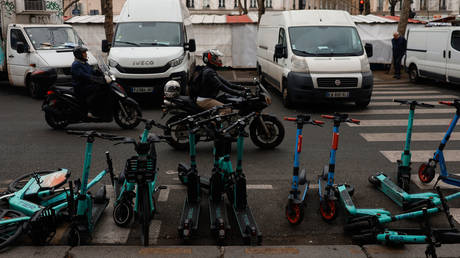
Residents voted to nix electric rental scooters in April after the mayor reversed her position on the conveyance
The last of Paris’ 15,000-strong fleet of battery-powered shareable e-scooters was removed from city streets on Thursday, ahead of a ban that took effect on Friday after the scooter operators’ contracts expired.
One of the first European cities to adopt the two-wheeled rentals five years ago, Paris became one of the first to ban renting them on the street after an April referendum delivered results showing 90% of voters wanted the vehicles gone.
Turnout was extremely low – just 7.5% of residents cast a ballot – and the rental companies complained about “restrictive voting methods” dragging Paris back into the public-transit dark ages despite the 2024 Olympics being just around the corner. However, the measure was championed by Mayor Anne Hidalgo, a Socialist and cycling advocate who had previously supported e-scooter shares. It does not affect private vehicles.
E-scooters – especially street rentals, which are favored by tourists and children (who could legally ride them at ages as young as 12, before the minimum age was increased to 14 in March) – have for years been the bane of cyclists, pedestrians, and motorists alike, weaving through traffic, cluttering pavement, and careening along (at up to 17 mph / 27 km/h) at speeds too fast for walkers and too slow for drivers.
There were three deaths associated with e-scooter accidents in 2022 alone, with 459 people injured due to the two-wheeled devices – an increase over 2021’s single fatality and 353 injuries.
That 2021 accident, in which a 31-year-old Italian woman was killed after an e-scooter carrying two people plowed into her, brought international attention to the problem, though rideshare advocates have argued the scooters cause a tiny percentage of overall traffic accidents in Paris.
The French capital had already cracked down on the scooters in 2019 and 2020, imposing built-in speed limits and tracking with hefty fines up to €1,500 ($1,617) for violators, a high-visibility clothing requirement, limiting how many operators could use one, and fining riders who “dumped” the scooters in the street after use.
Complaints about vehicular anarchy persisted, however, and Hidalgo reversed her support for the rideshares, calling April’s referendum and complaining about how unsustainable, dangerous, and “expensive” they were at €5 ($5.40) for ten minutes.
The rental companies operating e-scooter shares, including Dott, Lime, and Tier, reportedly plan to ship their Paris stocks to other European cities with more permissive regimes, including elsewhere in France.




